四因为as_because_for_since用法区别
- 格式:doc
- 大小:26.00 KB
- 文档页数:2
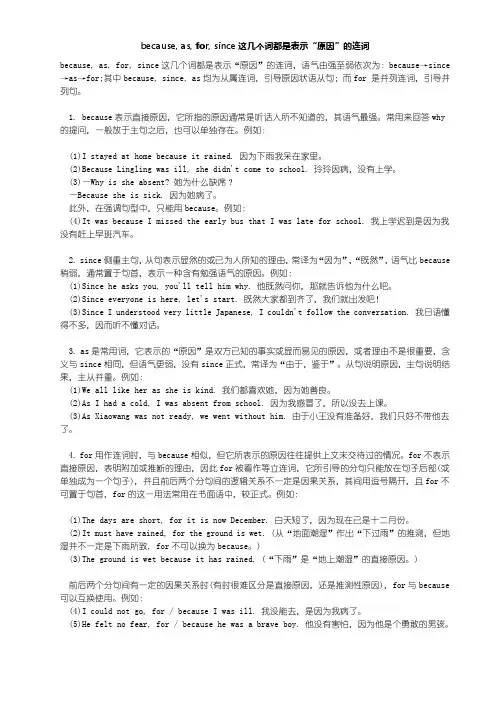
because, as, for, since这几个词都是表示“原因”的连词because, as, for, since这几个词都是表示“原因”的连词,语气由强至弱依次为:because→since →as→for;其中because, since, as均为从属连词,引导原因状语从句;而for 是并列连词,引导并列句。
1. because表示直接原因,它所指的原因通常是听话人所不知道的,其语气最强。
常用来回答why 的提问,一般放于主句之后,也可以单独存在。
例如:(1)I stayed at home because it rained. 因为下雨我呆在家里。
(2)Because Lingling was ill, she didn't come to school. 玲玲因病,没有上学。
(3)—Why is she absent? 她为什么缺席?—Because she is sick. 因为她病了。
此外,在强调句型中,只能用because。
例如:(4)It was because I missed the early bus that I was late for school. 我上学迟到是因为我没有赶上早班汽车。
2. since侧重主句,从句表示显然的或已为人所知的理由,常译为“因为”、“既然”,语气比because 稍弱,通常置于句首,表示一种含有勉强语气的原因。
例如:(1)Since he asks you, you'll tell him why. 他既然问你,那就告诉他为什么吧。
(2)Since everyone is here, let's start. 既然大家都到齐了,我们就出发吧!(3)Since I understood very little Japanese, I couldn't follow the conversation. 我日语懂得不多,因而听不懂对话。
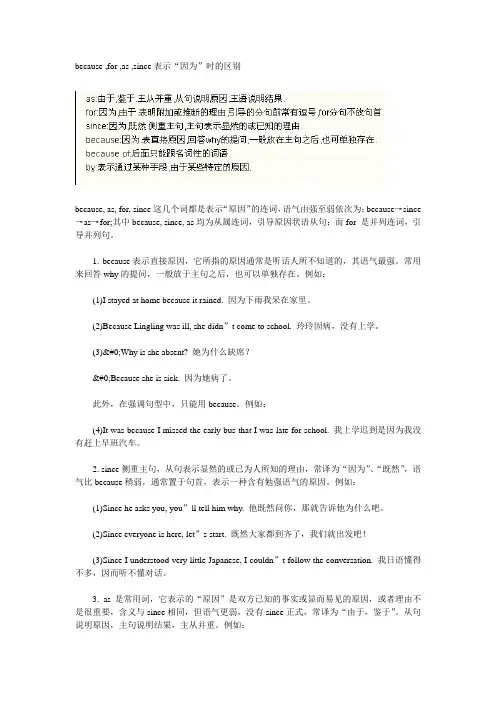
because ,for ,as ,since表示“因为”时的区别because, as, for, since这几个词都是表示“原因”的连词,语气由强至弱依次为:because→since →as→for;其中because, since, as均为从属连词,引导原因状语从句;而for 是并列连词,引导并列句。
1. because表示直接原因,它所指的原因通常是听话人所不知道的,其语气最强。
常用来回答why的提问,一般放于主句之后,也可以单独存在。
例如:(1)I stayed at home because it rained. 因为下雨我呆在家里。
(2)Because Lingling was ill, she didn”t come to school. 玲玲因病,没有上学。
(3)�Why is she absent? 她为什么缺席?�Because she is sick. 因为她病了。
此外,在强调句型中,只能用because。
例如:(4)It was because I missed the early bus that I was late for school. 我上学迟到是因为我没有赶上早班汽车。
2. since侧重主句,从句表示显然的或已为人所知的理由,常译为“因为”、“既然”,语气比because稍弱,通常置于句首,表示一种含有勉强语气的原因。
例如:(1)Since he asks you, you”ll tell him why. 他既然问你,那就告诉他为什么吧。
(2)Since everyone is here, let”s start. 既然大家都到齐了,我们就出发吧!(3)Since I understood very little Japanese, I couldn”t follow the conversation. 我日语懂得不多,因而听不懂对话。
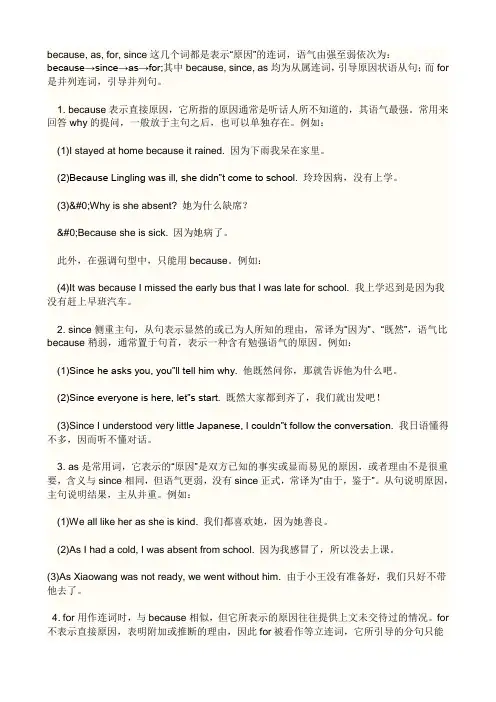
because, as, for, since这几个词都是表示“原因”的连词,语气由强至弱依次为:because→since→as→for;其中because, since, as均为从属连词,引导原因状语从句;而for 是并列连词,引导并列句。
1. because表示直接原因,它所指的原因通常是听话人所不知道的,其语气最强。
常用来回答why的提问,一般放于主句之后,也可以单独存在。
例如:(1)I stayed at home because it rained. 因为下雨我呆在家里。
(2)Because Lingling was ill, she didn”t come to school. 玲玲因病,没有上学。
(3)�Why is she absent? 她为什么缺席?�Because she is sick. 因为她病了。
此外,在强调句型中,只能用because。
例如:(4)It was because I missed the early bus that I was late for school. 我上学迟到是因为我没有赶上早班汽车。
2. since侧重主句,从句表示显然的或已为人所知的理由,常译为“因为”、“既然”,语气比because稍弱,通常置于句首,表示一种含有勉强语气的原因。
例如:(1)Since he asks you, you”ll tell him why. 他既然问你,那就告诉他为什么吧。
(2)Since everyone is here, let”s start. 既然大家都到齐了,我们就出发吧!(3)Since I understood very littl e Japanese, I couldn”t follow the conversation. 我日语懂得不多,因而听不懂对话。
3. as是常用词,它表示的“原因”是双方已知的事实或显而易见的原因,或者理由不是很重要,含义与since相同,但语气更弱,没有since正式,常译为“由于,鉴于”。
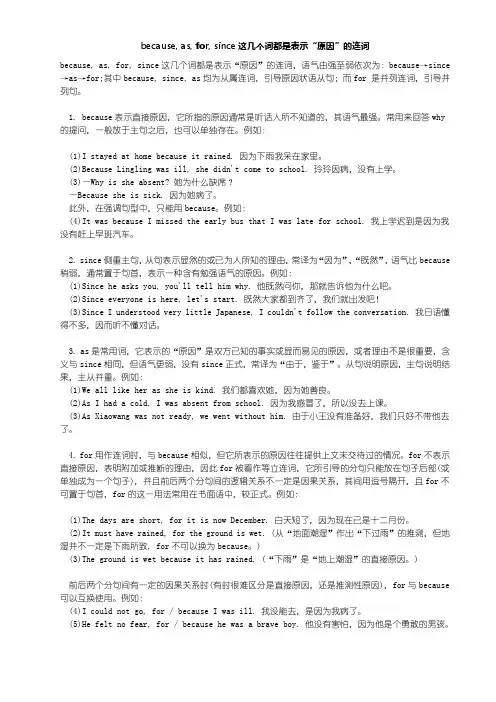
because, as, for, since这几个词都是表示“原因”的连词because, as, for, since这几个词都是表示“原因”的连词,语气由强至弱依次为:because→since →as→for;其中because, since, as均为从属连词,引导原因状语从句;而for 是并列连词,引导并列句。
1. because表示直接原因,它所指的原因通常是听话人所不知道的,其语气最强。
常用来回答why 的提问,一般放于主句之后,也可以单独存在。
例如:(1)I stayed at home because it rained. 因为下雨我呆在家里。
(2)Because Lingling was ill, she didn't come to school. 玲玲因病,没有上学。
(3)—Why is she absent? 她为什么缺席?—Because she is sick. 因为她病了。
此外,在强调句型中,只能用because。
例如:(4)It was because I missed the early bus that I was late for school. 我上学迟到是因为我没有赶上早班汽车。
2. since侧重主句,从句表示显然的或已为人所知的理由,常译为“因为”、“既然”,语气比because 稍弱,通常置于句首,表示一种含有勉强语气的原因。
例如:(1)Since he asks you, you'll tell him why. 他既然问你,那就告诉他为什么吧。
(2)Since everyone is here, let's start. 既然大家都到齐了,我们就出发吧!(3)Since I understood very little Japanese, I couldn't follow the conversation. 我日语懂得不多,因而听不懂对话。

![Because,since,as,for的用法区别[3]](https://uimg.taocdn.com/30a78728a31614791711cc7931b765ce05087a82.webp)
Because,since,as,for的用法区别一、becausebecause是最常用的表示原因或者解释的连词,它可以连接两个句子,也可以连接一个句子和一个短语。
because后面的从句通常是主要的信息,而前面的主句通常是次要的信息。
例如:He was late because his car brokedown.(他迟到了,因为他的车坏了。
)She didn't go to school because of herillness.(她因为生病没有去上学。
)因为because后面的从句往往是重点,所以不建议在句首使用beca use,否则会显得语气弱或者不礼貌。
例如:Because I love you, I will do anything foryou.(因为我爱你,我会为你做任何事。
)(不推荐)I will do anything for you because I loveyou.(我会为你做任何事,因为我爱你。
)(推荐)二、sincesince通常表示已知或者显而易见的原因,而不是新的或者意外的原因。
例如:He must be rich since he drives aFerrari.(他一定很有钱,因为他开着法拉利。
)(已知或者显而易见的原因)He is rich because he won thelottery.(他很有钱,因为他中了彩票。
)(新的或者意外的原因)since可以放在句首或者句中,但是如果放在句首,通常要倒装主句和从句的顺序。
例如:Since he is the boss, he can do whatever hewants.(既然他是老板,他可以做任何他想做的事。
)(正常顺序)He can do whatever he wants since he is theboss.(他可以做任何他想做的事,既然他是老板。
)(倒装顺序)since还有一个意思是“自从”,表示时间上的起点,这时候它不表示原因或者解释,而是表示时间状语。

b ec a u s e,s i n c e, a s,f o r表因为时的用法because, since, as, for表"因为"时的用法1.because表示直接原因,别人不知道的原因;2.since 强调双方已知,无需多解释的原因;3.as 跟 since 相似, 语气比 since 弱;4.for 跟 because 用法相似,但for表示的是猜测的原因,不是直接肯定的原因。
如:1.Because she’s ill,she can’t go to my home.因为她病了,所以她没有来我家.2.Since everyboby is here,let’s begin our meeting.既然大家都到了,那就开始开会吧.3.Day breaks,for the birds are singing.因为鸟儿在唱歌了,天可能亮了.4.As he was not well,i decided to go without him.由于他身体不太好,我决定不带他去.because, as, for, since这几个词都是表示“原因”的连词,语气由强至弱依次为:because→since→as→for;其中because, since, as均为从属连词,引导原因状语从句;而for 是并列连词,引导并列句。
1. because表示直接原因,它所指的原因通常是听话人所不知道的,其语气最强。
常用来回答why的提问,一般放于主句之后,也可以单独存在。
例如:(1)I stayed at home because it rained. 因为下雨我呆在家里。
(2)Because L ingling was ill, she didn’t come to school. 玲玲因病,没有上学。
(3)—Why is she absent? 她为什么缺席?—Because she is sick. 因为她病了。
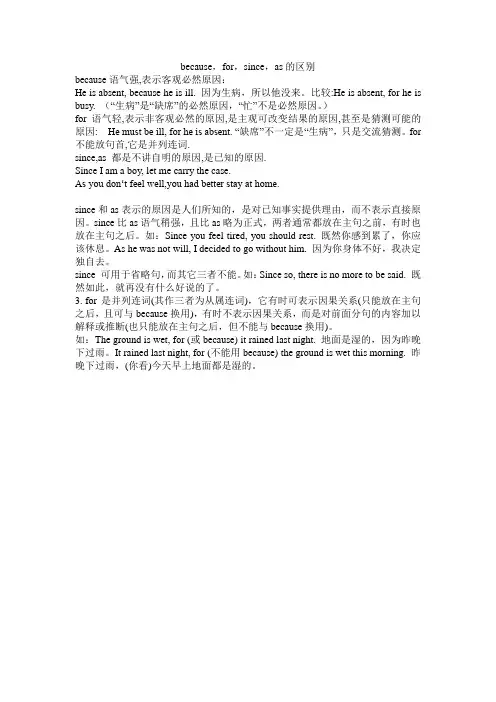
because,for,since,as的区别because语气强,表示客观必然原因:He is absent, because he is ill. 因为生病,所以他没来。
比较:He is absent, for he is busy. (“生病”是“缺席”的必然原因,“忙”不是必然原因。
)for 语气轻,表示非客观必然的原因,是主观可改变结果的原因,甚至是猜测可能的原因: He must be ill, for he is absent. “缺席”不一定是“生病”,只是交流猜测。
for 不能放句首,它是并列连词.since,as 都是不讲自明的原因,是已知的原因.Since I am a boy, let me carry the case.As you don…t feel well,you had better stay at home.since和as表示的原因是人们所知的,是对已知事实提供理由,而不表示直接原因。
since比as语气稍强,且比as略为正式,两者通常都放在主句之前,有时也放在主句之后。
如:Since you feel tired, you should rest. 既然你感到累了,你应该休息。
As he was not will, I decided to go without him. 因为你身体不好,我决定独自去。
since 可用于省略句,而其它三者不能。
如:Since so, there is no more to be said. 既然如此,就再没有什么好说的了。
3.for是并列连词(其作三者为从属连词),它有时可表示因果关系(只能放在主句之后,且可与because换用),有时不表示因果关系,而是对前面分句的内容加以解释或推断(也只能放在主句之后,但不能与because换用)。
如:The ground is wet, for (或because) it rained last night. 地面是湿的,因为昨晚下过雨。
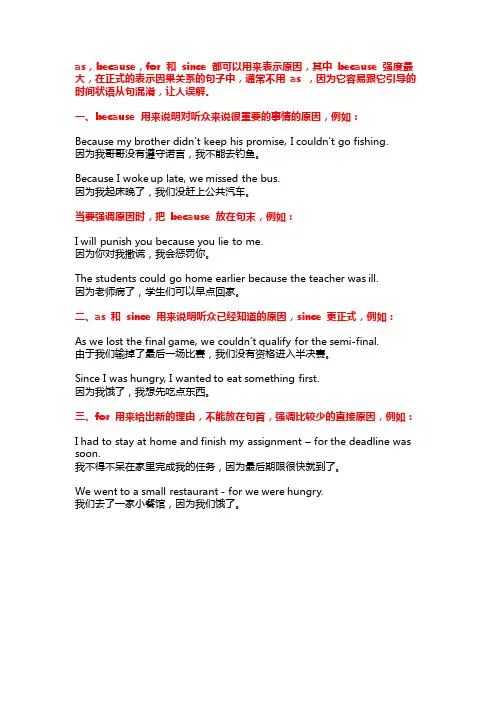
as,because,for 和since 都可以用来表示原因,其中because 强度最大,在正式的表示因果关系的句子中,通常不用as ,因为它容易跟它引导的时间状语从句混淆,让人误解。
一、because 用来说明对听众来说很重要的事情的原因,例如:Because my brother didn’t keep his promise, I couldn’t go fishing.因为我哥哥没有遵守诺言,我不能去钓鱼。
Because I woke up late, we missed the bus.因为我起床晚了,我们没赶上公共汽车。
当要强调原因时,把because 放在句末,例如:I will punish you because you lie to me.因为你对我撒谎,我会惩罚你。
The students could go home earlier because the teacher was ill.因为老师病了,学生们可以早点回家。
二、as 和since 用来说明听众已经知道的原因,since 更正式,例如:As we lost the final game, we couldn’t qualify for the semi-final.由于我们输掉了最后一场比赛,我们没有资格进入半决赛。
Since I was hungry, I wanted to eat something first.因为我饿了,我想先吃点东西。
三、for 用来给出新的理由,不能放在句首,强调比较少的直接原因,例如:I had to stay at home and finish my assignment – for the deadline was soon.我不得不呆在家里完成我的任务,因为最后期限很快就到了。
We went to a small restaurant - for we were hungry.我们去了一家小餐馆,因为我们饿了。
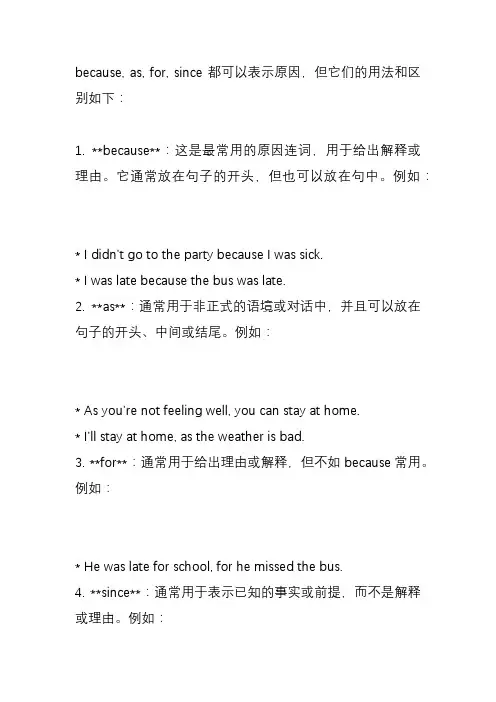
because, as, for, since 都可以表示原因,但它们的用法和区别如下:
1. **because**:这是最常用的原因连词,用于给出解释或理由。
它通常放在句子的开头,但也可以放在句中。
例如:
* I didn't go to the party because I was sick.
* I was late because the bus was late.
2. **as**:通常用于非正式的语境或对话中,并且可以放在句子的开头、中间或结尾。
例如:
* As you're not feeling well, you can stay at home.
* I'll stay at home, as the weather is bad.
3. **for**:通常用于给出理由或解释,但不如because常用。
例如:
* He was late for school, for he missed the bus.
4. **since**:通常用于表示已知的事实或前提,而不是解释或理由。
例如:
* Since you're not feeling well, you should stay at home.
总结:because 通常用于解释或理由,as 更口语化,for 较少用于给出理由,而since 更侧重于已知事实或前提。
选择哪个连词取决于语境和要表达的意思。
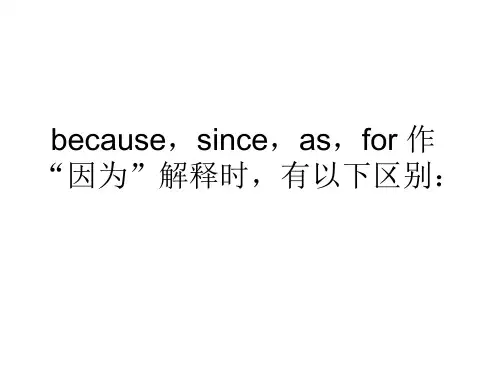
because, as, since, for, 的区别because的用法:通常表示直接而明确的原因和理由,语气很强,用来回答why的问题, 多放于主句之后。
例:We couldn't go out because it was too cold.因为天气太冷,我们不能外出。
as的用法:“因为、由于”,语气比because弱,表示的是不言而喻、显而易见的原因和理由,其从句一般放在主句前。
例: As it was late ,we came back soon.由于时间很晚了,我们很快就回来.As rain has fallen, the air is cooler.因为下过雨,空气比较清爽。
Since的用法:“既然”, 语气较弱,强调已知的事实,其从句一般放在主句前。
既然你回答不出这个问题,我就问别人了。
例:Since you can't answer the question, I'll ask someone else.既然他的方法不行,我们就试试你的吧.Since his method doesn't work, let's try yours.既然你对此如此有把握,他会相信你的。
Since you are so sure of it, he’ll believe you.For的用法:并列连词,表示对前一分句补充说明,放在句末。
例:It must be morning for the birds are singing.一定是清晨了,因为鸟儿在叫。
It will rain, for it’s getting dark。
要下雨了,因为天气越来越暗了。
例如:He introduced me because I was new.Since you are going, I will go, too.As it is raining, you’d better take a taxi.It must have rained last night, for the ground is wet.。
Because,since,as,for的用法区别在英语中,because,since,as,for都可以用来表示原因或者理由,但是它们之间有一些细微的差别。
本文将介绍它们的用法区别,并给出一些例句和练习题,匡助您掌握它们的正确使用方法。
一、becausebecause是最常用的表示原因或者理由的连词,它可以连接两个句子,也可以连接一个句子和一个短语。
because后面的从句通常是主要的信息,而前面的主句通常是次要的信息。
因此,如果想强调原因或者者理由,可以把because从句放在句首。
例如:- He didn't go to school because he wassick.(他没有去上学,因为他生病了。
)- Because he was sick, he didn't go toschool.(因为他生病了,他没有去上学。
)二、sincesince也可以用来表示原因或者理由,但是它比because更正式,而且通常用于已经为人所知或者不言自明的情况。
since后面的从句通常是已经发生或者已经确定的事实,而前面的主句通常是对这个事实的结果或者推论。
因此,如果想强调结果或者推论,可以把since从句放在句首。
例如:- She has been very popular since she won the Nobel Prize.(自从她获得了诺贝尔奖,她就非常受欢迎。
)- Since she won the Nobel Prize, she has been very popular.(她获得了诺贝尔奖,因此她非常受欢迎。
)三、asas也可以用来表示原因或者理由,但是它比since更正式,而且通常用于书面语言中。
as后面的从句通常是对前面主句的解释或者补充,而且两个句子之间的逻辑关系比较密切。
因此,如果想强调解释或者者补充,可以把as从句放在句首。
例如:- He was late for the meeting, as he had missed thebus.(他迟到了会议,因为他错过了公交车。
Because,since,as,for的用法区别作为自然语言处理机器人,我将在下文中为大家详细介绍"Because, since, as, for"这四个单词的用法区别。
首先,我们需要明确的是,这四个词都是用来表示原因的连词,它们都可以将一句话中的两个部分连接起来,形成因果关系。
然而,它们之间还是有不同的用法和适用场景的。
1. Because"Because"是最常用的表达原因的连词,它的作用是直接说明前面的部分是后面的原因。
例如:- I didn't go to school today because I was sick.在这个例子中,因为前面的部分是“我今天没有去学校”,而后面的部分是“我生病了”,我们可以明显地看到二者之间的因果关系。
然而,需要注意的是,因为“because”的语气比较直接,有时候会带有过于强烈的语气。
因此,在写作中,为了语气更加稳妥,有时候我们也可以使用其他替代词。
2. Since"Since"的作用和"Because"非常类似,也是用来表达一种因果关系。
但是与"Because"不同的是,"Since"更加强调已经发生过的事情,它更适用于描述一个过去的事件和它对现在的影响。
例如:- Since I quit smoking, I've felt much healthier.在这个例子中,我们可以看到前面的事件是“我戒烟了”,而后面的结果是“我的健康状态变得更好了”。
"Since"的用法相当于是在强调戒烟这一事件对现在的影响。
需要注意的是,"Since"也可以表示时间的含义,因此在有些情况下,可能会存在歧义。
例如:- Since we arrived early, we had plenty of time to explore the city.这个例子中的"Since"指的是时间,也就是意味着“因为我们早到了,我们有足够的时间去探索这个城市”。
Because,since,as,for的用法区别语气和语义的差异句型和位置的差异与其他词语的搭配和区别常见的误用和纠正语气和语义的差异这四个连接词都可以表示“因为”,但是它们的语气和语义有所不同,具体如下:since表示已知原因,即导致结果发生的已经为人所知或显而易见的原因,通常是说话人和听话人都知道或认可的,因此无需多加解释。
它的语气比because稍弱,常译为“既然”或“由于”。
as表示明显原因,即导致结果发生的比较明显或不言自明的原因,通常是说话人和听话人都知道或可以推断出来的,因此只是陈述事实。
它的语气比since更弱,常译为“由于”或“鉴于”。
for表示推断原因,即导致结果发生的不一定是直接或唯一的原因,而是说话人根据已有的事实或看法进行推断或补充说明的原因。
它的语气最弱,常译为“因为”或“因为呢”。
举例说明:I stayed at home because itrned.(我呆在家里是因为下雨了。
)这里because表示下雨是我呆在家里的直接原因,可能是听话人不知道下雨了,所以需要解释。
Since you are so busy, I won't bother you anymore.(既然你这么忙,我就不再打扰你了。
)这里since表示你很忙是我不再打扰你的已知原因,可能是说话人和听话人都知道你很忙,所以无需多说。
As he is a teacher, he knows alot.(由于他是老师,他知道很多。
)这里as表示他是老师是他知道很多的明显原因,可能是说话人和听话人都认为老师知道很多,所以只是陈述事实。
He must be ill, for he lookspale.(他一定生病了,因为他看起来很苍白。
)这里for表示他看起来很苍白是他生病了的推断原因,可能是说话人根据他苍白的面色进行推测或补充说明。
句型和位置的差异这四个连接词在句型和位置上也有一些差异,具体如下:because为从属连词,引导原因状语从句,从句可以放在主句之前或之后,但如果放在主句之前,则要用逗号隔开;如果单独存在,则要用冒号引出。
Because,since,as,for的用法区别一、becausebecause是最常用的表示原因或者解释的连词,它可以连接两个完整的句子,也可以连接一个句子和一个短语。
because后面的从句通常是已知的或者明显的原因,而主句则是需要解释的结果或者判断。
例如:He stayed at home because he wassick.(他呆在家里,因为他生病了。
)She was late because of thetraffic.(她因为交通阻塞而迟到了。
)注意:because不能用于表示目的或者意图,也不能用于否定句中表示意外或者出乎意料的结果。
例如:He studied hard in order to pass theexam.(他努力学习,为了通过考试。
)(不能用because)She didn't go to the party, even though she wasinvited.(她没有去参加聚会,尽管她被邀请了。
)(不能用because )二、sincesince也可以用来表示原因或者解释,但是它比because更正式,而且更强调从句中的原因是已经存在的、公认的或者不容置疑的事实。
例如:He must be rich, since he can afford such a luxurycar.(他一定很富有,因为他能买得起这么豪华的汽车。
)Since you are here, you might as well stay fordinner.(既然你来了,你不妨留下来吃晚饭。
)注意:since也可以用来表示时间,意思是“自从……以来”,这时它可以放在句首或者句中,但是要注意时态的变化。
例如:I haven't seen him since he moved to anothercity.(自从他搬到另一个城市后,我就没见过他了。
)Since I graduated from college, I have been working as a teacher.(自从我大学毕业后,我向来在做老师。
Because, as, for, since的区别Because, as, for, since这几个词都是表示“原因”的连词,语气强弱依次为:because>since>as>>for;其中because, since, as均为从属连词(这里指用于引出直接或根本原因),引导原因状语从句;而for是并列连词(这里指用于引出非直接或根本原因),引导并列句。
并列连词[for]:这里指用于引出非直接原因或表可能性推断的连词the ground is wet ≈>(表可能)it rained last night从属连词[because, since, as]:这里指用于引出比较直接的原因或表必然性推断的连词it rained last night =>(表确定)the ground is wet语气强弱的界定/意义:强→弱直接原因非直接原因肯定性(一定因为…)不确定性(可能因为…)强调原因(从句)强调结果(主句)❶ because表示“因为”,用来表示最直接的因果关系或是听话人所不知道的原因,它所表达的语气是这四个词中最为强烈的,它所引导的原因状语从句一般(95%)要放在主句之后。
例如:(1)I stayed at home because it rained. 因为下雨我呆在家里。
(2)Because Lingling was ill, she didn’t come to school. 玲玲因病,没有上学。
(注: 以下两种情况只能用because来回答:1、用why来提问的特殊疑问句的回答,只能用because;He didn’t attend the meeting because he had too much work to do.2、在强调句中,只能用because。
It is because it rained last week that they put off the match.)❷for用作连词时,与because相似,用于引出非直接原因,表明可能性的推断或因果关系较弱的附加信息,因此for被看作并列连词。
“SI因为”because for as since
because, as, for, since这几个词都是表示“原因”的连词,语气由强至弱依次为:because→since→as→for;其中because, since, as均为从属连词,引导原因状语从句;而for 是并列连词,引导并列句。
1. because表示直接原因,它所指的原因通常是听话人所不知道的,其语气最强。
常用来回答why的提问,一般放于主句之后,也可以单独存在。
例如:
(1)I stayed at home because it rained. 因为下雨我呆在家里。
(2)Because Lingling was ill, she didn”t come to school. 玲玲因病,没有上学。
(3)——Why is she absent? 她为什么缺席?
——Because she is sick. 因为她病了。
此外,在强调句型中,只能用because。
例如:
(4)It was because I missed the early bus that I was late for school. 我上学迟到是因为我没有赶上早班汽车。
2. since侧重主句,从句表示显然的或已为人所知的理由,常译为“因为”、“既然”,语气比because稍弱,通常置于句首,表示一种含有勉强语气的原因。
例如:
(1)Since he asks you, you”ll tell him why. 他既然问你,那就告诉他为什么吧。
(2)Since everyone is here, let”s start. 既然大家都到齐了,我们就出发吧!
(3)Since I understood very little Jap anese, I couldn”t follow the conversation. 我日语懂得不多,因而听不懂对话。
3. as是常用词,它表示的“原因”是双方已知的事实或显而易见的原因,或者理由不是很重要,含义与since相同,但语气更弱,没有since正式,常译为“由于,鉴于”。
从句说明原因,主句说明结果,主从并重。
例如:
(1)We all like her as she is kind. 我们都喜欢她,因为她善良。
(2)As I had a cold, I was absent from school. 因为我感冒了,所以没去上课。
(3)As Xiaowang was not ready, we went without him. 由于小王没有准备好,我们只好不带他去了。
4. for用作连词时,与because相似,但它所表示的原因往往提供上文未交待过的情况。
for不表示直接原因,表明附加或推断的理由,因此for被看作等立连词,它所引导的分句只能放在句子后部(或单独成为一个句子),并且前后两个分句间的逻辑关系不一定是因果关系,其间用逗号隔开,且for不可置于句首,for 的这一用法常用在书面语中,较正式。
例如:
(1)The days are short, for it is now December. 白天短了,因为现在已是十二月份。
(2)It must have rained, for the ground is wet. (从“地面潮湿”作出“下过雨”的推测,但地湿并不一定是下雨所致, for不可以换为because。
)
(3)The ground is wet because it has rained. (“下雨”是“地上潮湿”的直接原因。
) 前后两个分句间有一定的因果关系时(有时很难区分是直接原因,还是推测性原因),for与because可以互换使用。
例如:
(4)I could not go, for / because I was ill. 我没能去,是因为我病了。
(5)He felt no fear, for / because he was a brave boy. 他没有害怕,因为他是个勇敢的男孩。